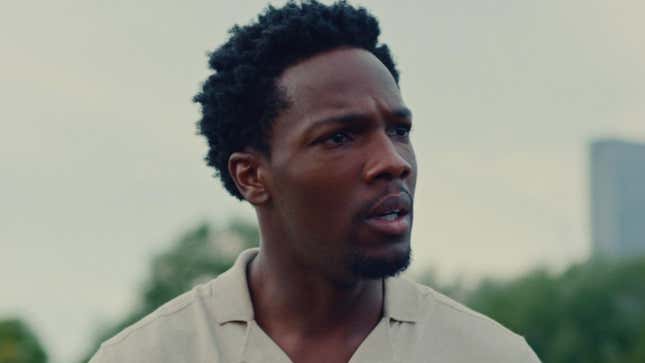
The fifth episode of Rapman’s Supacell resolves the previous episode’s cliffhanger, showing us what it’s like for several superheroes to be in the same location and the same fight. Episode five focuses on Rodney Cullen (Calvin Demba) as the super forces collide.
Rodney decides to visit his mother, with whom he has an estranged relationship. In a quick but informative scene, we learn that she’s staying with a man Rodney doesn’t approve of. He offers to help financially, but she promises she’s got a good life and is happy. Distraught, he asks to stay and even offers to pay rent, but she denies him because her partner, Rick, is not approving. The implication is that Rodney’s white mother chooses this new person and new family over him, her biracial son, motivates Rodney to reunite with Michael and the other superheroes.
You’re being watched
Throughout the series, we’ve seen an experimental facility in which a white man oversees the superheroes and Black captives behind bars. In this episode, we learn that he and his staff have been actively tracking the main characters, and that he takes a special interest upon learning four of them have been in the same location concurrently. The facility gets more cut scenes this episode, emphasizing how they are invasively tracking the superheroes.
Whenever multiple heroes are in proximity of each other, the people in the facility take notice. Because community social worker and Michael’s fiancee Dionne doesn’t have superpowers, she’s able to operate under the radar as she investigates disappearances.
We continue to see the devastating impact of Sickle Cell Disease as Michael’s mother experiences a crisis. He stays overnight at the Sickle Cell Center, then decides to tell Dionne the truth about the future and her possible murder, as he learned about it by visiting the future the first time he used his powers in the initial episode. He laments being unable to change the outcome of her death, even when given some of the information he might need to do so.. The disproportionate presence of Sickle Cell Disease in Black communities, the lack of support for patients and families struggling with this disease, and Michael’s perceived inability to change outcomes for both his mother and Dionne represents a large picture in the struggle of the Black communities represented in the show, and the greater human experience – it’s like always swimming against the current.
As we now know, the Sickle Cell gene is also related to the superpowers the characters have, exposing pain in a more chronic way, and bringing characters together to heal.
Investigating the disappearance of Jasmine, Dionne (Adelayo Adedayo) tracks down her parents. She learns that Jasmine’s father has Sickle Cell Disease, but Jasmine was able to heal his pain using her superpowers. Brought back together by Michael’s mother’s health crisis, Dionne and Michael get a chance to talk – but they’re interrupted by Rodney, who insists Michael leaves now.
This is hard to watch. Michael has been on a quest to be there for everyone, save everyone, and do the right thing, and he drops the ball. Instead of telling Rodney he needs to hold on a moment, Michael abandons Dionne, delaying off their big conversation.
Supacell and women characters
This could have been an opportunity for Michael to be truthful, but instead he falls short, and for a weak reason.. In the beginning of the series, Michael was so easy to root for. But like many of the male characters, he treats women as an afterthought if not an object, and this makes it hard to believe he’s going to act with responsibility in the future–even though he can see the future himself.
My assumption is that his failure to warn Dionne or be honest with her will lead to her death, making her a plot point and another fridged female character in superhero history, because having a motivational tragedy for Michael is more important than having him treat his fiancee with respect. I hope the show moves in a better direction, but it isn’t looking good in conjunction with Sharleen’s (Rayxia Ojo) abuse becoming her personality in addition to a plot point. Taze (Josh Tedeku), meanwhile, potentially murders a woman in broad daylight, leading him to be a less redeemable character by the minute.
Sharleen’s constant dive into danger overshadows Sabrina’s (Nadine Mills) good news. Here, however, it’s not careless writing buried in tropes, but it’s clearly meant to be an injustice that Sabrina’s career achievement is overshadowed by abuse and violence.
The male characters in the show are constantly examined, judged, and captured by systems in society. In truth, most of them don’t trust each other, which is why it takes so long for Michael and Rodney to get Andre (Eric Kofi Abrefa) to trust him and consider joining the team. And even then, Rodney only wants to help Michael because he thinks Michael can and will rewind time to help his injured friend. The overarching power structures intentionally damage the trust and the Black community. But it’s clear the women suffer most, and the men can’t break free of the cycle of both receiving and perpetuating unfairness.
Overall, this episode should have had more like pieces come together, but instead the storytelling was disjointed and it fell flat. Hopefully, the final episode packs more of a punch when it comes to connectedness, or permits Michael to use his powers to access the past in a way that changes the story and empowers all of the characters, including Dionne.
.




